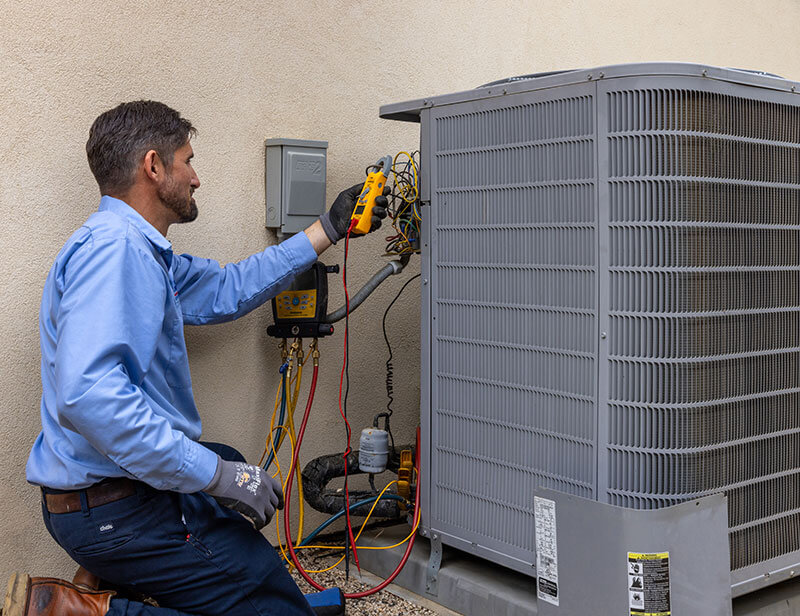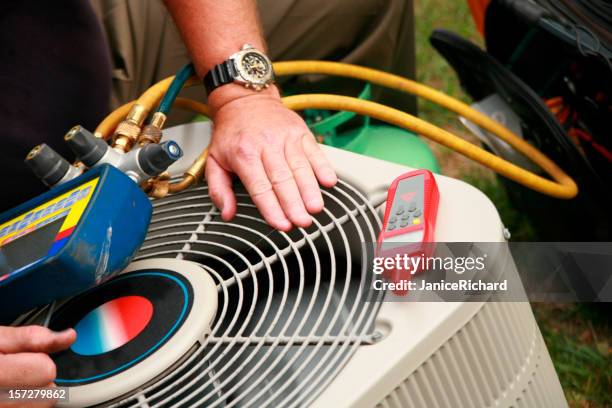Your First Steps with heat pump installation ooltewah tn
Selecting Between a Heatpump and Heating System: Trick Factors To Consider for Your Cooling And Heating Demands
When reviewing home heating choices for a/c requires, the decision in between a heatpump and a heating system can be complicated. Each system offers distinct benefits tailored to specific environments and power efficiency goals. Comprehending these distinctions is vital for making an enlightened choice. Secret elements such as setup prices and environmental effect further complicate the selection procedure. Which option truly straightens with one's comfort and sustainability choices? The adhering to sections will check out these factors to consider in information.
Comprehending Warmth Pumps: How They Work and Their Advantages
While numerous homeowners take into consideration various home heating options, comprehending exactly how warmth pumps function and their benefits can considerably affect their choice. Heat pumps run by transferring warmth as opposed to creating it. In the winter season, they remove heat from the outside air or ground and transfer it inside, while in the summertime, they reverse this procedure, cooling the home by getting rid of warm outside. This double functionality makes them flexible for year-round environment control.One of the primary benefits of heatpump is their energy effectiveness. They use significantly much less electrical power contrasted to traditional heating systems, possibly resulting in lower utility bills (heat pump installation ooltewah tn). In addition, heatpump have a smaller carbon footprint, making them an eco pleasant option. They additionally call for much less maintenance than conventional systems, adding to long-lasting cost savings. Generally, comprehending the technicians and benefits of heatpump can aid homeowners make notified decisions regarding their home heating and cooling requirements
Checking Out Heaters: Types, Operation, and Benefits
Furnaces come in various kinds, including gas, electric, and oil designs, each with unique functional devices. Recognizing these distinctions is essential, as they impact performance and home heating performance. Additionally, furnaces use many advantages, such as consistent warm result and dependability in chillier climates.
Sorts of Furnaces
Furnace can differ significantly in design and operation, with furnaces being a popular selection amongst house owners. There are numerous kinds of heaters, each using various fuel sources and innovations. Gas heaters are typical, leveraging gas to produce warmth successfully. Electric heaters, on the other hand, utilize electric resistance to create warmth, commonly preferred for their uncomplicated installation. Oil furnaces, while much less usual, are reliable in locations with limited gas gain access to (heat pump service). Additionally, condensing heating systems optimize energy performance by recycling and capturing exhaust gases. Each type runs with a system of warmth exchangers and ductwork to distribute cozy air throughout a home. Recognizing the distinctions in between these furnace kinds is important for notified HVAC decisions
Advantages of Heaters
For homeowners looking for reliable warmth throughout cool months, the advantages of heating systems are substantial. Heating systems give constant heating, ensuring also temperature levels throughout the home. They are specifically efficient in extreme cool, frequently outmatching heatpump in freezing conditions. Various types, consisting of gas, electric, and oil heaters, offer adaptability to satisfy diverse demands and preferences.Furnaces also tend to have lower preliminary installment expenses contrasted to warm pumps, making them an extra accessible option for lots of. Their robust design contributes to a much longer life expectancy, with several systems lasting over 15 years with correct maintenance. Additionally, contemporary furnaces are often geared up with advanced technology for enhanced effectiveness, which can cause lowered energy expenses. In general, furnaces continue to be a dependable selection for reliable home heating.

Energy Performance: Comparing Warmth Pumps and Furnaces
When contrasting energy efficiency in between heat pumps and heaters, the Seasonal Energy Performance Ratio (SEER) plays an important function in figuring out efficiency. In addition, an operational expense evaluation exposes the lasting economic implications of each system. Comprehending these factors can assist homeowners in making informed decisions concerning their home heating solutions.
Seasonal Energy Effectiveness Proportion
Power performance plays a vital duty in the decision-making procedure in between warmth pumps and furnaces, particularly when thinking about the Seasonal Power Performance Ratio (SEER) This metric measures the cooling efficiency of heatpump over an entire air conditioning season, offering a standardized way to assess efficiency. Greater SEER scores show higher power effectiveness, converting to lower power usage and minimized utility bills. In contrast, furnaces are normally examined making use of the Annual Fuel Utilization Efficiency (AFUE) ranking, which mirrors heating efficiency. When contrasting these 2 systems, home owners should prioritize SEER scores for warmth pumps, as they straight effect general energy cost savings and ecological sustainability. An extensive understanding of SEER can significantly influence the lasting fulfillment and cost-effectiveness of the chosen heating and cooling remedy.
Operational Expense Analysis
Understanding the functional costs connected with heatpump and furnaces is vital for house owners assessing their choices. Heatpump generally supply greater energy efficiency, transforming electric energy right into warm with very little waste. This leads to reduced monthly energy expenses, especially in modest climates. Conversely, typical heating systems, specifically gas designs, may have reduced upfront costs yet can incur greater operational costs gradually due to fuel prices and performance ratings.Moreover, heat pumps can function as both home heating and cooling systems, potentially decreasing the requirement for separate HVAC systems. While first financial investments for heatpump may be greater, their lasting savings in power efficiency can make them a more cost-efficient choice for lots of households. Mindful evaluation of local energy rates is necessary to figure out the ideal option.
Setup Prices: What to Anticipate for Each Heating System
Installment prices for heating unit can differ substantially in between heatpump and furnaces, influencing house owners' choices. Heatpump generally have higher upfront installment prices, generally varying from $3,500 to $8,000, relying on the unit size and intricacy of installment. This includes the outside device, interior handling system, and required ductwork alterations. On the other hand, furnaces often tend to have reduced initial costs, averaging in between $2,500 and $6,000, which can be appealing for budget-conscious home owners. Setup costs can enhance if comprehensive ductwork is required.Moreover, the choice of gas kind for heaters-- natural gas, propane, or electric-- can additionally affect installation prices. While warm pumps offer power performance, their first investment might discourage some buyers. Inevitably, evaluating installation expenses alongside lasting financial savings and effectiveness will aid house owners in making educated choices concerning their furnace.
Climate Factors To Consider: Which System Performs Better in Your Location
Exactly how do climate problems influence the effectiveness of heating systems? The efficiency of heatpump and furnaces can differ considerably depending upon the neighborhood climate. In modest environments, heat pumps stand out by efficiently transferring warm from the outdoors air, making them an energy-saving option. However, their performance decreases in exceptionally chilly temperatures, where they may battle to remove sufficient heat. On the other hand, heating systems, specifically gas designs, provide trusted and constant warmth despite exterior conditions, making them more suitable in chillier regions.In areas that experience milder winter seasons, heat pumps can run successfully year-round, supplying both cooling and heating. On the other hand, regions with severe wintertimes usually take advantage of the toughness of heating systems. Eventually, understanding the regional climate is important when deciding in between a heatpump and a heater, as it straight affects their operational efficiency and overall performance.
Maintenance Requirements: Long-Term Look After Warm Pumps vs. Furnaces
While both heat pumps and heaters call for routine maintenance to guarantee peak efficiency, their specific requirements and care regimens vary significantly. Heating systems usually need much less regular focus, with annual evaluations sufficing to check for gas leakages, clean filters, see this site and analyze total performance. Their less complex design commonly enables uncomplicated repairs.In contrast, warmth pumps require biannual upkeep due to their dual duty in heating & cooling. This includes cleaning coils, examining refrigerant degrees, and guaranteeing that both the indoor and outside units operate at their best. Furthermore, heatpump upkeep commonly entails even more detailed elements, making specialist servicing essential.Neglecting maintenance can lead to lessened efficiency and boosted energy prices for both systems. Ultimately, house owners should consider these long-lasting treatment needs when picking in between a heatpump and a furnace, as aggressive maintenance can extend the life expectancy and efficiency of either system significantly.
Ecological Effect: Picking a Sustainable Heating Choice
The ecological influence right here of heater is a vital analysis for home owners seeking lasting alternatives. Heatpump are usually a lot more energy-efficient than standard heating systems, as they transfer warm instead than create it, greatly minimizing carbon exhausts. By making use of renewable resource resources, such as air-source or geothermal warmth pumps, homeowners can even more lessen their ecological footprint.On the various other hand, natural gas heating systems give off greenhouse gases and contribute to air pollution, though they often give higher heat result. Nonetheless, advancements in technology have actually brought about the advancement of high-efficiency heating systems that decrease emissions.Ultimately, selecting a heating system entails weighing efficiency against environmental influence. Homeowners are urged to assess neighborhood power resources and incentives for renewable systems, making certain an option that aligns with both personal convenience and environmental obligation. The decision influences not only instant comfort but additionally long-term sustainability and environmental wellness.
Often Asked Inquiries
How Much Time Do Warmth Pumps and Furnaces Typically Last?
The life expectancy of heatpump commonly ranges from 15 to twenty years, while heaters can last in between 15 to thirty years. Routine upkeep considerably influences their longevity and efficiency in offering heating services.
Can I Use a Heat Pump in Incredibly Cold Climates?
Warmth pumps can operate in very cold climates, but their effectiveness diminishes as temperature levels decline. In such conditions, additional home heating sources may be required to maintain comfy indoor temperatures and ensure peak performance.

What Is the Noise Degree of Heat Pumps Versus Furnaces?
The sound degrees of heatpump and heating systems differ considerably. Usually, heatpump operate even more silently than typical furnaces, making them preferable for those sensitive to seem, while furnaces may generate louder functional noises during heating cycles.
Are Heat Pumps Suitable for Both Cooling And Heating?
Heatpump are certainly ideal for both heating and cooling (heat pump installation ooltewah tn). They operate by moving heat, supplying efficient temperature control year-round, making them a flexible option for property owners looking for an all-in-one heating and cooling service
What Size Heating Unit Do I Required for My Home?
Identifying the proper size furnace for a home needs assessing aspects such as square video, insulation top quality, local environment, and the home's layout. Consulting a professional can guarantee an exact evaluation and perfect convenience. Warmth pumps typically supply greater power efficiency, transforming electrical power right into warmth with minimal waste. In moderate climates, warm pumps excel by effectively transferring heat from the outdoors air, making them an energy-saving option. Conversely, heating systems, especially gas models, supply consistent and reliable warmth regardless of outside conditions, making them more suitable in chillier regions.In locations that experience milder winters months, warm pumps can run efficiently year-round, offering both heating and air conditioning. Heat pumps are typically a lot more energy-efficient than conventional furnaces, as they move heat instead than generate it, significantly reducing continue reading this carbon emissions. By using sustainable power sources, such as air-source or geothermal warm pumps, house owners can better reduce their environmental footprint.On the other hand, natural gas heaters emit greenhouse gases and contribute to air pollution, though they typically offer higher heat result.